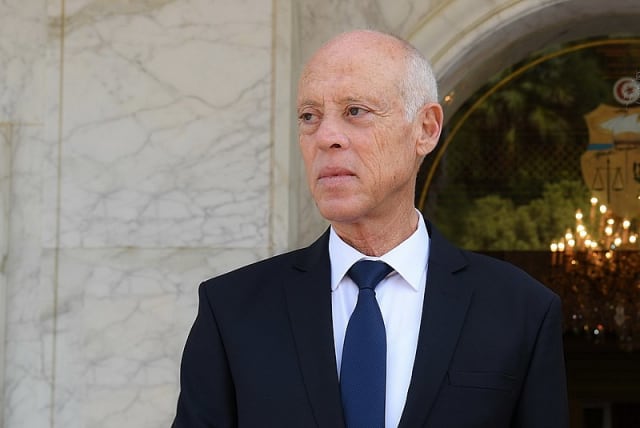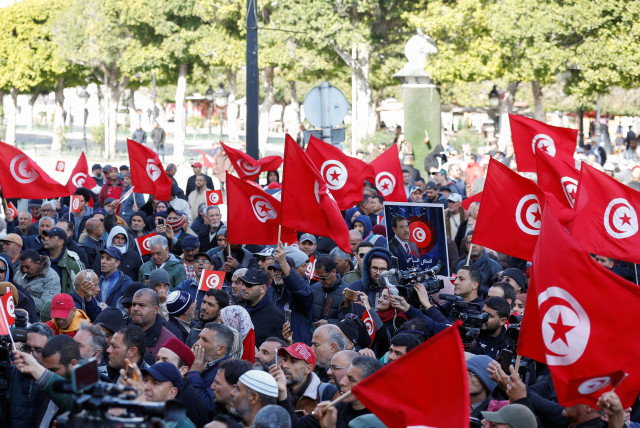Since Tunisia’s Saied seized control, the country’s economic situation continues to deteriorate

IMF loans stall as Saied rebuffs its demands for reform; meanwhile, Europe offers aid to buy influence.
This month marks two years since Tunisian President Kais Saied, in an effort to consolidate his grip on power, issued Decree 117. The decree came two months after he dismissed the prime minister and suspended parliament. It gave him the authority to rule by decree, bypassing the legislative branch entirely, and gave him wide-ranging control over various sectors, including the judiciary, media, and human rights, essentially allowing him to govern without any checks or balances.
The move was condemned at home and abroad as a blow to democracy, even though some initially welcomed it as a way of exiting the country’s political gridlock.
The past two years have witnessed a marked decline in the country’s economy, accompanied by the growth of anti-government opposition.
During the Tunisian Revolution of 2010-2011, a popular uprising against corruption and repression led to the initiation of democracy and the establishment of a constitution in 2014. In 2021, Saied dismissed the government and suspended parliament, ruling by decree until a new 2022 constitution concentrated power in the president’s hands. Saied’s government has become increasingly authoritarian ever since.
“The Tunisian economic situation today is worse than in the period preceding Saied’s takeover,” said Francesco Sassi, a researcher at Ricerche Industriali ed Energetiche, an Italian think tank. Essential medicines have grown scarce, and the price of some everyday groceries has soared, while others have become unavailable.
The inflation rate in the North African country was 5.6% in 2020, the year before Saied’s takeover. In 2022 it was 8.3% and is expected to reach almost 11% in 2023.
Rejecting the IMF
Last year, the International Monetary Fund (IMF) offered Tunis a $1.9 billion loan to help address the country’s economic crisis. However, the IMF demanded in return reforms that Saied’s government rejected, and the loan has stalled.
Sassi said the IMF loan could jumpstart the Tunisian economy but said the reforms are “untenable” for the president. They include the removal of subsidies on fuel and goods to rebalance the country’s budget, which Saied fears will hurt consumers. The IMF has also asked for legislation to restructure over 100 state-owned firms which hold monopolies in many economic sectors.
Ioannis-Sotirios Ioannou, a foreign affairs analyst and founder of Geopolitical Cyprus, a Nicosia-based consultancy, told The Media Line that the agreement with the IMF remains problematic and that Saied’s populist rhetoric is making things more difficult.
Earlier this year, Saied explained his refusal to comply with the IMF’s demands by saying Tunisians should “work on our own” and that “social peace is not a game.”
“Tunisia failed to deliver reforms, and without a comprehensive plan for dealing with its debt, which is 80% of its GDP, the economic situation will deteriorate,” Ioannou warned.
Despite broad international condemnation of Saied’s authoritarianism, foreign powers are providing the country with financial aid to gain influence on issues of importance to them.
“Europe is implicitly supporting the relentless shifting of one of the few democracies of the region into a dictatorship,” Sassi said.
The EU, for its part, “is trying to connect illegal migration to the economic situation,” Ioannou added. Earlier this month, the EU provided Tunisia with one billion euros in financial aid “to provide stability regarding migration flows, and at the same time help the negotiation with the IMF.”
“Migration flows are the quintessential issue for all the conservative governments in the EU,” Sassi explained.
Tunisia is a major route for sub-Saharan migrants seeking entry to Europe, chiefly through Italy.
Ioannou also cited Europe’s importance to Tunisia.
“[The EU] remains a strategic partner that can help deal with IMF’s bailout, macroeconomic stability, trade and investment, green energy transition, people-to-people contacts, and migration—which remains a strategic priority for the Eastern Mediterranean and South EU member-states,” Ioannou said.
Saied’s situation is less than ideal in terms of internal public support. Protests are set for this week in Tunisia’s capital Tunis, Ioannou said.
“Saied’s presidency is at the epicenter of strong criticism by the opposition since Tunisia was the first country that joined the political reforms of the 2010-2011—usually designated as the ‘Arab Spring,’” he said.
Sassi says that Saied’s most prominent political supporters are in the military, security forces, and secret services.
“[These] same groups are the ones to be favored the most by the EU economic aid promised in exchange for ‘managing’ migration and keeping sub-Saharan migrants away from European coasts,” he said.
Jerusalem Post Store
`; document.getElementById("linkPremium").innerHTML = cont; var divWithLink = document.getElementById("premium-link"); if (divWithLink !== null && divWithLink !== 'undefined') { divWithLink.style.border = "solid 1px #cb0f3e"; divWithLink.style.textAlign = "center"; divWithLink.style.marginBottom = "15px"; divWithLink.style.marginTop = "15px"; divWithLink.style.width = "100%"; divWithLink.style.backgroundColor = "#122952"; divWithLink.style.color = "#ffffff"; divWithLink.style.lineHeight = "1.5"; } } (function (v, i) { });

